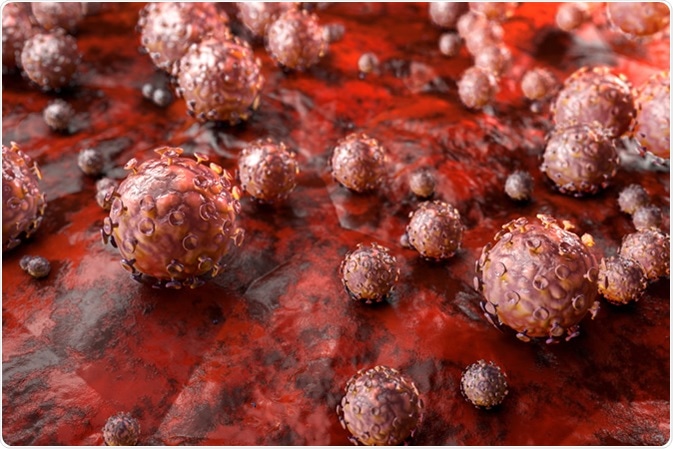Skip to
- HPV vaccination
- Vaccine hesitancy
- Safety concerns with HPV vaccination
Human papillomavirus (HPV) is a group of viruses that are usually transmitted through sexual contact. There are at least 100 types of this virus, of which around 14 are high-risk types that have been linked to cervical cancer.
Cervical cancer is the second most common cancer in female segment of the developing world, with about 570 000 new cases being diagnosed in these regions, and 311 000 deaths worldwide from this cause, each year.
The most high-risk strains among these are HPV 16 and 18, accounting for 70% cases of cervical cancers. They are also involved in the formation of pre-cancerous cervical lesions. HPV types 6 and 11 are common causes of genital warts.
HPV also causes cancer of the vulva and vagina, anus, penis and even the oropharynx.

HPV vaccination
HPV vaccination is a major recommendation of healthcare agencies like WHO and is available as part of routine immunization programmes in around 65 countries. It prevents HPV infection, but cannot treat it.
Three types of HPV vaccines are currently available:
- Bivalent vaccine – Provides protection against HPV types 6 and 11
- Quadrivalent vaccine – Provides protection against HPV types 16 and 18
- Nonavalent vaccine – Provides protection against HPV types 6/11/16/18/31/33/45/52/58
HPV vaccines have proved efficacious in various real-world settings. However, some recent reports of autoimmune disorders following HPV vaccination have led to discussions about their safety.
Despite national recommendations, the uptake rate of HPV vaccines in the United States has been disappointing. As per reports from the Infectious Diseases Society of America, only about 16 percent of U.S. adolescents have been fully vaccinated against human papillomavirus (HPV) by the time they turn 13. These data highlight the need for efforts to encourage vaccination and to improve immunization rates.
Vaccine hesitancy
Although scientific data support the efficacy of the vaccine, concerns regarding vaccine safety have led to the phenomenon termed “vaccine hesitancy”. Vaccine hesitancy has led to the spread of various diseases which could have been easily avoided by efficient vaccination. The recent measles outbreak in Italy is one such example.
The poor uptake rate of HPV vaccine may be attributed to numerous factors such as
- Parental hesitancy
- Mistrust and uncertainty regarding scientific data, with claims that the information related to the vaccine is unreliable and biased
- Fear of the potential long-term side effects of the vaccine
- Issues related to cost-effectiveness
- Increased exposure to fake information
Safety concerns with HPV vaccination
Several studies have been carried out to assess the risk of autoimmune disorders following HPV vaccination. These found no increased risk of autoimmune disorders in girls who received quadrivalent human papillomavirus (HPV4) vaccination. The rate of diagnosis was in keeping with the general risk in the age groups concerned.
Nationwide registries were used to extract data for two large cohort studies of the HPV4 vaccine , and these too found similar outcomes. A meta-analysis published in 2018 also clears up the misconception associated with HPV vaccine use.
Cervical cancer is responsible for numerous deaths worldwide and the benefits of the HPV vaccine are immense. Universal vaccination can deliver substantial health benefits. It is up to healthcare professionals to rebuild and maintain public trust. It is important to evaluate individual reasons for vaccine hesitancy. This may help to design strategies that are more apt to address the given concerns.
Sources
- Liu EY, et al. (2018). Quadrivalent human papillomavirus vaccination in girls and the risk of autoimmune disorders: the Ontario Grade 8 HPV Vaccine Cohort Study. CMAJ. doi:10.1503/cmaj.170871
- Genovese C, et al. (2018) HPV vaccine and autoimmune diseases: systematic review and meta-analysis of the literature. J Prev Med Hyg. doi:10.15167/2421-4248/jpmh2018.59.3.998
- World health Organisation. (2019) Human papillomavirus (HPV) and cervical cancer. www.who.int/…/human-papillomavirus-(hpv)-and-cervical-cancer
- Scheller NM et al. (2015) Quadrivalent HPV vaccination and risk of multiple sclerosis and other demyelinating diseases of the central nervous system. JAMA. doi: 10.1001/jama.2014.16946.
- Arnheim-Dahlström L,et al. (2013) Autoimmune, neurological, and venous thromboembolic adverse events after immunisation of adolescent girls with quadrivalent human papillomavirus vaccine in Denmark and Sweden: cohort study. BMJ. doi:10.1136/bmj.f5906
Further Reading
- All Autoimmune Disease Content
- What is Autoimmune Disease?
- Types of Autoimmune Disease
- Autoimmune Disease Development Of Therapies
- The Hygiene Hypothesis and Autoimmune Disorders
Last Updated: May 21, 2019
Source: Read Full Article
